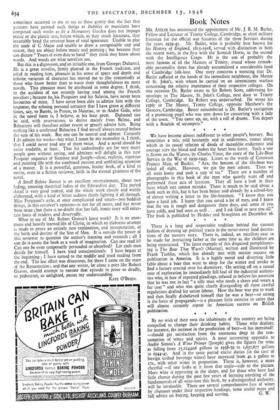Book Notes
MR. ATTLEE has announced the appointment of Mr. J. R. M. Butler, Fellow and Lecturer of Trinity College, Cambridge, as chief military historian for the official war histories of the three Services during the years 1939-45. Mr. Butler, who is probably best known for his History of England, 1815-1918, served with distinction in both the recent wars, in the first with the Scottish Horse, in the second with the Intelligence Corps. He is the son of probably the most famous of all the Masters of Trinity, round whose remark- able personality there has already accumulated a considerable fund of Cambridge folk-lore. One story concerns a worsting that Dr. Butler suffered at the hands of his immediate neighbour, the Master of St. John's, with whom he carried on an intermittent warfare concerning the relative importance of their respective colleges. On one occasion Dr. Butler wrote to Sir Robert Scott, addressing his envelope to The Master, St. John's College, next door to Trinity College, Cambridge. Sir Robert was unperturbed. He wrote his reply to The Master, Trinity College, opposite Matthew's the Grocers, Cambridge. Better remembered is Dr. Butler's castigation of a promising pupil who was sent down for consorting with a lady of the town. " You came up, sir, with a roll of drums. You depart with a flourish of strumpets."
* * * * We have become almost indifferent to other people's, bravery. But sometimes a tale, told hesitantly and in undertdnes, comes along which in its casual relation of deeds of incredible endurance and courage stirs the blood and makes the heart beat faster. Such a one is Storm on the Waters, by Charles Vince, the story of the Life-Boat Service in the War of 1939-1945. Listen to the words of Coxswain Francis Mair, of Buckie. " Aye, the bottom of the life-boat was holed all right. However, we got the men ashore. Then we all went home and took a cup of tea." There are a number of photographs in this book of the men who quietly went off and performed these acts of heroism. They all have a look in their faces which one cannot mistake. There is much to be said about a book such as this, but it has been better said already by a school-boy of eleven writing a letter to the life-boatmen. " I know that you have a hard job. I know that you saved a lot of men, and I know that the sea is rough and dangerous these days, and some of you have colds, and bad ones as well . . . and I ask God to save you all." The book is published by Hodder and Stoughton on December 16 * * * * There is a long and respectable tradition behind the current fashion of dressing up political tracts in the never-never land decora- tions of the nursery story. There is, indeed, an excellent case to be made for instructing father at the same time as the children are being entertained. The latest example of this disguised pamphleteer- ing is The Bear That Wasn't (Murray), written and illustrated by Frank Tashlin, which has already met with outsize success on publication in America. It is a highly moral and diverting little fable about a bear that went to sleep for the winter and awoke to find a factory erected over his dormitory. On setting off on a casual tour of exploration he immediately fell foul of the industrial authori- ties who, in face of repeated pleadings, refused to believe his assertion that he was not in fact " a silly man who needs a shave and wears a fur coat " and who was quite clearly disregarding all those careful regulations drafted for union labour. How the bear was put to work and then finally disbelieved himself that he was a bear—so strong is the force of propaganda—is a pleasant little exercise in satire that will almost certainly repeat its American success on British publication. * * * * By no wish of their own the inhabitants of this country are being compelled to change their drinking habits. Those who deplore, for instance, the increase in the production of beer—it has increased! —should get satisfaction from the enormous drop in the con- sumption of wines and spirits. A most interesting appendix to Andre Simon's A Wine Primer (Joseph) gives the figures for wine as falling from 15,224,906 gallons in 1938-39 to 1,637,677 gallons in 1944-45. And in the same period excise duties (in the case of foreign tasked beverage wines) have increased from 4s. a gallon to 17s., with other wines in proportion. There is, however, a more cheerful —if one looks at it from that angle—side to the picture. More wine is appearing in the shops, and for those who have had little chance during the past few years of learning anything of the fundamentals of all wine-lore this book, by a distinguished authority, will be invaluable. There are several comprehensive lists of wines by chateaux under their respective headings, some useful maps and full advice on buying, keeping and serving. G. W.


































 Previous page
Previous page